- Home
- Colm Toibin
The Testament of Mary Page 7
The Testament of Mary Read online
Page 7
I tell the truth not because it will change night into day or make the days endless in their beauty and the comfort they offer us, we who are old. I speak simply because I can, because enough has happened and because the chance might not come again. It will not be long maybe when I begin again to dream that I waited on the hill that day and held him naked in my arms, it will not be long before that dream, so close to me now and so real, will fill the air and will make its way backwards into time and thus become what happened, or what must have happened, what happened, what I know happened, what I saw happened.
What happened was this. They held me between them as they ran and it became clear to me that our guardian did not have anything planned. He knew as little as we did about where he was going. We could not go back into the city. He had some money, but we had no food. It struck me that he was urging us forward so he could save himself, that the grand plan for my protection came later, but it was not dominant in those hours. In the way they work now, my guests who come, they try to make connections, weave a pattern, a meaning into things, and they ask me to help, and I will help them as I have done already, but not now. Now I know how random it was and uncertain, and there are things that happened on that journey that I do not care even now to conjure up. I know we were not good in those days because we were desperate. We took clothes because we needed clothes and I took shoes because I needed shoes. We did not take money and we did not kill anyone. I don’t believe we killed anyone but there were things I did not see. We moved as quickly as we could and sometimes there was no food and sometimes we were sure we were being followed or had been noticed. We told whoever we needed to tell that this was my daughter with her husband and we were travelling without any goods or donkeys to carry us because my son had gone ahead in a caravan with all our belongings. Those lies do not matter, maybe even other things we did to help us on our journey do not matter, but I cannot be sure.
What is hard to understand is that our dreams matter. Just as we made progress by night more than by day after what happened on that hill, at least for those first days, so too what came when we were asleep lingers more pressingly within me now than it did then. It is strange that it does not seem to matter now that we terrorized a household which lay alone, vulnerable and innocent, in the countryside, and that we took food and clothes and shoes and three donkeys which we let loose after a few hours, and that our guardian tied a man, his wife and their children up, having threatened them, so that they could not follow us. We saw that. I wore the shoes and the clothes and we made better progress using their donkeys. All of that happened.
But what happened also was the dream we had; Mary and I shared a dream. I did not know you could share a dream. In the years when I was married we dreamed separate dreams, although we lay close beside each other, often touching each other through the night. Dreams belong to each of us alone, just as pain does. Now in these desperate days when we were starving sometimes and out of breath and filled with fear and when Mary and I realized that our guardian had no plan, he was taking us towards water, or the sea, he was depending on luck, and that as each day went by, unless we found a ship or shelter, and the chances of our not being captured were growing dim, Mary and I remained close. We held each other as we walked; we slept in each other’s arms for warmth and protection. And both of us knew that if we were caught we would be murdered, stoned to death, or strangled, and left to rot. We barely spoke to our guardian and barely managed to conceal our contempt for him, so great was our fear of being captured now after all of this, so great was our rage at being lured into the wilds by a man who was incompetent, with all the trappings of pomposity around him dying away through lack of food and pure exhaustion.
We both dreamed that my son came back to life. We both dreamed we were sleeping and there was a well made of wood and stone, a well that was much used because it went deep into the earth and yielded a sweeter, cooler, clearer water than other wells. We were alone there. It was the morning, but no one yet had come to the well as the sun had just risen. We both slept leaning against the stone. In front of us there was no pathway, which was strange, and there were some olive trees in the distance, but none close, and no sound, no birdsong, or bleating from goats, nothing. Both of us sleeping, still in our robes, and the dawn light. No sign that our guardian was anywhere close, and the fear and the manic movement of the days quite absent. And suddenly both of us were woken by the sound of water gurgling up from the earth as if someone invisible had come to fetch water and the water was rising as though unbidden and then spilling over. I am sure that the water spilled over and that I was fully awoken now by it as it wet my robe. But still I did not stand up; instead I put my hand into the water to make sure that it was real, and it was. But Mary stood up to avoid the water and what she saw made her gasp. I looked at her, but I did not see what she saw at first because I was so surprised by the water, which now seemed to be rushing out of the well, it was pumping out in vast spurts and spilling over and trickling down towards the trees, gradually forming a small stream.
And then I turned and I saw him. He had come back to us, he was rising with the water, its power pushing him up from the earth. He was naked and the places where he had been wounded, including his hands, his feet, his legs where the bones had been broken, his forehead where the thorns had been, had blue marks around them and were open and gaping. The rest of his body was white. Mary held him as the water delivered him from the well and she placed him across my lap. We both touched him. It was the whiteness that we both noticed, a whiteness that is hard to describe. Both of us remarked on its purity and smooth, luminous beauty.
In our dream there were moments before we woke in which he opened his eyes, in which he moved his hands and then his arms, and groaned almost, but it was gentle, both the movement and the sound. He seemed to have neither pain nor any memory of what he had been through. But the marks were there on his body. We did not speak to him. We simply held him and he seemed to be alive.
And then he was still, or he was dead, or I woke, or we both woke. And there was nothing else. Because we could not contain ourselves, our guide heard every word. Something changed in him then, he began to smile and said that he had always known that this would happen, that it was part of what had been foretold. He made us recount it in detail and when we had done so a number of times and he seemed to have committed it to memory, he said we were safe, that something else would happen which would guide us towards wherever it was we needed to go. There was a lightness in us then, a lightness caused by hunger and maybe by fear. Whatever it was it left us free.
I knew and Mary knew that we were moving blindly and I realized at certain times that we would be safer were Mary to separate from us and make her way home. Later, when a house was found for us, we could discuss this more calmly. We both knew that I could never go home, that I could never appear in any of the places where I would be known. But she could and I knew she wanted to. And then the calm days ended. The end was caused by food and by rest and by the change in our guide, which gave him a sort of glow. This glow meant that one or two people, complete strangers, and then others who knew he had been a follower, offered to help him. Through them he could send for help; and then he could tell us that we would soon be safe, that a boat would come for us and take us to Ephesus where there was a house waiting, a house where we would always be protected. He did not understand that his reassurances, that the comforts he offered us, seemed to make no difference to the grief that came now, the shock and the shame at what we had done. We had left others to bury my son, or perhaps he had not been buried at all. We had run to a place where what happened in our dreams took on more flesh, had more substance, than our lives when we were conscious, alert, aware. And that seemed right for some days and maybe both of us hoped that the future would be coated in dreams too; and then it collapsed, all of it, and I knew that Mary would want to go, that she no longer wanted to be with me. I knew what would happen and it did: one morning she simply was not there in
the other bed when I woke. And our guide had arranged for her to go since she wanted to. It was not a time when farewells were necessary or would have made any difference. I did not mind the method of her going. But I was alone with him now and I was going to have to work out a way of handling him. I also needed to make distinctions which were clear. From then on I wanted dreams to have their place, to let them belong to the night. And I wanted what happened, what I saw, what I did, to belong to the day. Until I died I hoped that I would live in full recognition of the difference between the two. I hope I have done that.
It is day now and what comes in here to this room is called light. What was strange as we boarded the vessel that took me here and sailed through storms and calm seas was that I had developed a hunger for catastrophe, that as we boarded I desperately needed, as though for my peace of mind, our guide or one of our helpers to fall into the water and howl for help and disappear and rise again and then be found later floating away dead. I wanted it back, whatever it was. I saw it not as itself, but as image, or simple reminder. When I saw a man, I saw a violent death, and I felt I would be ready now to witness it, as an animal who has been in the wild will know what to expect, or what to do, when a gentle hand comes with food, presuming the animal is tame. I had been made wild by what I saw and nothing has ever changed that. I have been unhinged by what I saw in daylight and no darkness will assuage that, or lessen what it did to me.
I do not often leave the house. I am careful and watchful; now that the days are shorter and the nights are cold, when I look out of the windows I have begun to notice something that surprises me and holds me. There is a richness in the light. It is as if, in becoming scarce, in knowing that it has less time to spread its gold over where we are, it lets loose something more intense, something that is filled with a shivering clarity. And then when it begins to fade, it seems to leave raked shadows on everything. And during that hour, the hour of ambiguous light, I feel safe to slip out and breathe the dense air when the colours are fading and the sky seems to be pulling them in, calling them home, until gradually nothing stands out in the landscape. It pleases me and makes me feel almost invisible as I walk towards the Temple to spend a few minutes standing close to one of the pillars watching the shadows deepen and all things preparing for the night.
I move like a cat as I stand and edge forward and then stand again. Even though I feel that I cannot be seen or noticed as easily as I might were it noon or morning, I am always alert, as one of those thin wild cats is alert, ready to dart away with speed at the slightest hint of danger.
On one of those days I realized that I had stayed too long in the Temple and that night was already falling when I came out into the clearing. I knew that I would have to move with speed to be home before darkness came as the nights were nights of pure blackness with hardly a sliver of a moon whose light would be too faint to guide me. I could not therefore use the winding path I always used, but made my way more directly, climbing as best I could the short, steep slope that would lead me home in better time.
And then, in the fading light in this place where I have come to end my days, I passed stones that I had not seen before. Slabs of thin stone, like teeth, jutting up from the earth as though they grew there. I felt free to lean on one of them when my hip hurt from walking too fast. And then something in the grass and scrub, some animal sound, caused me to turn and I was so frightened by what I saw that I almost ran. Carved into the stone were two figures almost as tall as I am, and on both of them shone the last slanting rays of the sun, hitting the whiteness of the stone and making it glisten. One of the figures was young and almost naked. The expression on his face was placid, innocent. I felt that he could easily have stepped out from where he had been carved and come towards me, as the light seemed to intensify. Despite my initial alarm, I was not now afraid of him. Beside him stood an older man with a beard and his hand was to his face and it was clear that he was weeping, that he too lived in loss. He was in distress; something had happened of which the young man seemed unaware. Maybe that is how the dead are, they are unaware, they do not miss the world or know what happens here. As I stood and watched both men, the young one I imagined to be dead and his father alive and filled with the anguish of those of us who are in the world still, I noticed under the young man, lying crouched, was a child who was crying, who seemed curled up in grief wilder than the grief of the standing man. Then as the rays of the sun lowered, I saw in the lingering light that all around me were stones with carvings, with figures, even animals, and also some words. In the distance they had seemed random, things that had just been left there, but now it was clear that they had been put here for a purpose, and the carvings must mean something, and as I walked away from them quickly I knew that they stood for death.
There are times in these days before death comes with my name in whispers, calling me towards darkness, lulling me towards rest, when I know that I want more from the world. Not much, but more. It is simple. If water can be changed into wine and the dead can be brought back, then I want time pushed back. I want to live again before my son’s death happened, or before he left home, when he was a baby and his father was alive and there was ease in the world. I want one of those golden Sabbath days, days without wind when there were prayers on our lips, when I joined the women and intoned the words, the supplication to God to give justice to the weak and the orphan, maintain the right of the lowly and the destitute, rescue the needy, deliver them from the hands of the wicked. When I said these words to God, it mattered that my husband and son were close by and that soon, when I had walked home alone and sat in the shadows with my hands joined, I would hear their footsteps returning and I would await my son’s shy smile as the door was opened for him by his father and then we would sit in silence waiting for the sun to disappear when we could talk again and eat together and prepare with ease for the peaceful night after the day when we had renewed ourselves, when our love for each other, for God and the world, had deepened and spread.
This is over now. The boy became a man and left home and became a dying figure hanging on a cross. I want to be able to imagine that what happened to him will not come, it will see us and decide – not now, not them. And we will be left in peace to grow old.
They will return, my minders, my guards. They have me watched in any case. In a few days they will know that I woke in the dawn like this and stood in this room. Somebody will have seen a shadow, something through the window, or heard a sound. I am not alone here. Perhaps they pay Farina to watch me and report on me, or threaten her with something if she does not. Or it could be one of the others whom I pass and do not speak to. It does not matter.
And each time we start again at the beginning and each time they move from being excited by a detail to being exasperated by something that comes soon afterwards, another detail maybe, a refusal to add what they want me to add, or an opinion I express on their tone or their efforts to make simple sense of things which are not simple.
But maybe they are simple. Maybe when I die, and I will die soon, they will be even simpler. It will be as though what I saw and felt did not happen, or happened in the same way a small flap of a bird’s wing in the high sky happens on a day when there is no wind. They want to make what happened live for ever, they told me. What is being written down, they say, will change the world.
‘The world?’ I asked. ‘All of it?’
‘Yes,’ the man who had been my guide said, ‘all of it.’
I must have looked perplexed.
‘She does not understand,’ he said to his companion, and it was true. I did not understand.
‘He was indeed the Son of God,’ he said.
And then, patiently, he began to explain to me what had happened to me at my son’s conception as the other nodded and encouraged him. I barely listened. I had other things to do. I know what happened. I know that my own happiness in those first months when I was with child felt strange and special, that I lived in a way that was different, that I oft
en stood at the window and looked at the light outside and felt that the new life within me, the second heart beating, fulfilled me beyond anything I had ever imagined. Later, I learned that this is how we all prepare ourselves to give birth and to nurture, that it comes from the body itself and makes its way into the spirit and it does not seem ordinary. So I smiled when they spoke because they seemed to know something that was true about the light and grace that came at that time and for once I liked how eager and sure they were.
It was when they came to the last part that I stood up from the chair and moved away from them, assaulted by their words.
‘He died to redeem the world,’ the other man said. ‘His death has freed mankind from darkness and from sin. His father sent him into the world that he might suffer on the cross.’
‘His father?’ I asked. ‘His father –?’
‘His suffering was necessary,’ he interrupted, ‘it was how mankind would be saved.’
‘Saved?’ I asked and raised my voice. ‘Who has been saved?’
‘Those who came before him and those who live now and those who are not yet born,’ he said.
‘Saved from death?’ I asked.
‘Saved for eternal life,’ he said. ‘Everyone in the world will know eternal life.’
‘Oh, eternal life!’ I replied. ‘Oh, everyone in the world!’
I looked at both of them, their eyes hooded and something dark appearing in their faces.

 The Magician
The Magician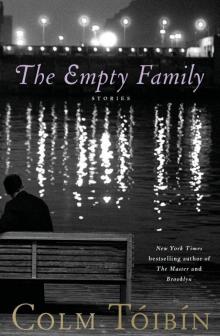 The Empty Family (v5)
The Empty Family (v5)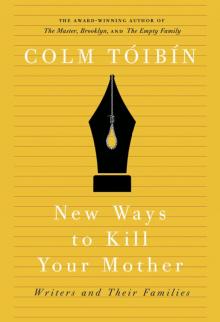 New Ways to Kill Your Mother
New Ways to Kill Your Mother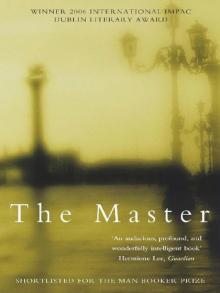 The Master
The Master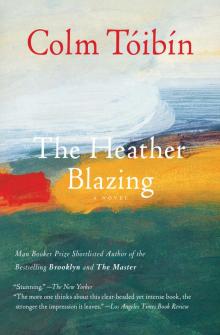 The Heather Blazing
The Heather Blazing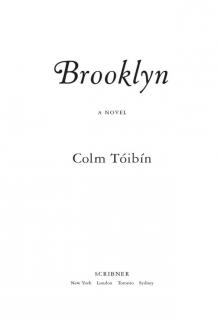 Brooklyn
Brooklyn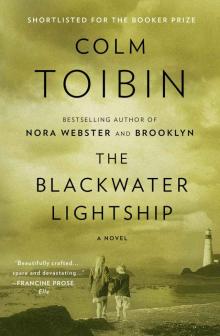 The Blackwater Lightship
The Blackwater Lightship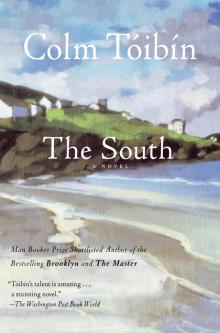 The South
The South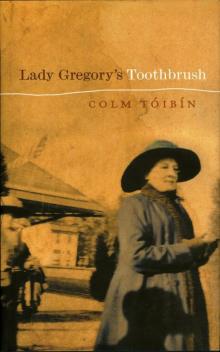 Lady Gregory's Toothbrush
Lady Gregory's Toothbrush House of Names
House of Names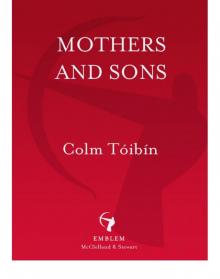 Mothers and Sons
Mothers and Sons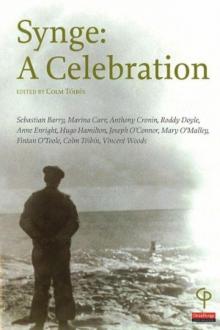 Synge
Synge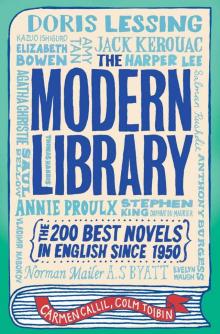 The Modern Library
The Modern Library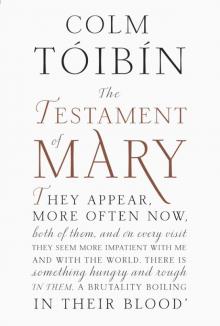 The Testament of Mary
The Testament of Mary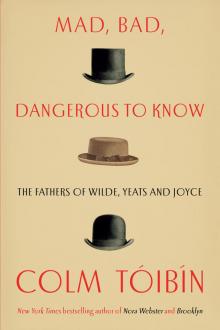 Mad, Bad, Dangerous to Know
Mad, Bad, Dangerous to Know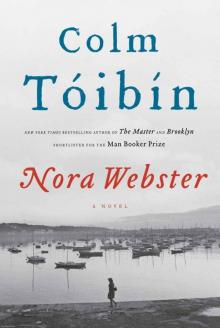 Nora Webster: A Novel
Nora Webster: A Novel